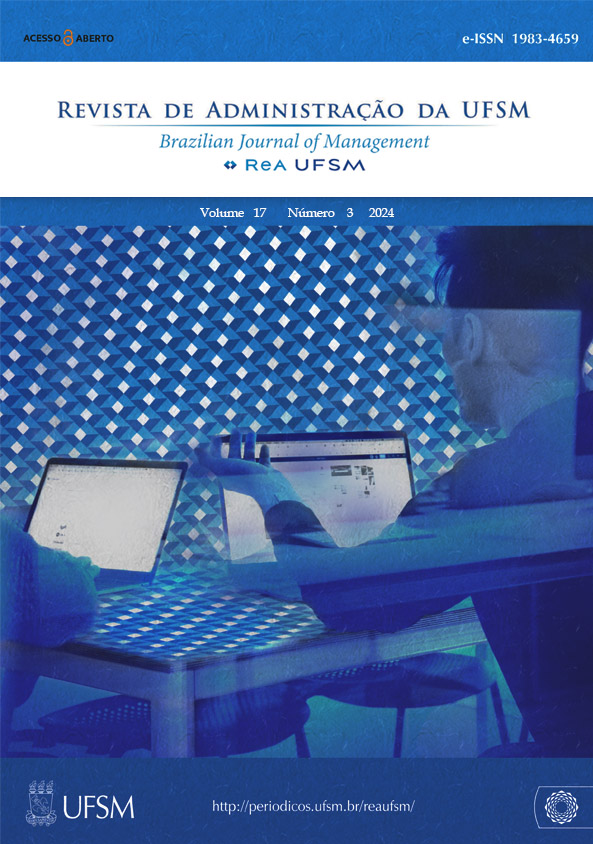Organizational culture and remote work: case study in a high complexity hospital
DOI:
https://doi.org/10.5902/1983465988465Keywords:
Organizational culture, Cultural change, Telework, Home office, Remote workAbstract
Purpose – the general objective of the study presented in this article was to describe and analyze how a highly complex hospital institution implemented the practice of home office in its operations during the pandemic.
Methodology – a qualitative and exploratory approach was adopted. Data collection was carried out through semi-structured interviews conducted with six managers of Hospital Gama and a questionnaire with multiple-choice and essay questions completed online by employees of these managers' teams.
Findings – the results indicated that: (1) facilitating elements provided by the hospital, managers, and employees were applied to the migration of the work modality; (2) several challenges were identified to the new modality, the overcoming of which could foster the transformation of the hospital's culture in the medium and long term; (3) the hospital was not prepared in terms of technology and human resources for the transition process, but a set of quick actions were taken to make the migration from in-person work to home office possible; (4) the advantages indicated by the interviewees about the new modality corroborate the literature that served as the theoretical basis for this research; and (5) the level of employee engagement during the change process appears to have remained the same or increased, according to the perceptions of the research participants.
Originality – presents a single case study that describes and analyzes the process of migration from in-person work to telework as a consequence of the COVID-19 pandemic in a reference hospital for complex operations in the city of São Paulo.
Downloads
References
Atkinson, C., & Hall, L. (2009). The role of gender in varying forms of flexible working. Gender, Work & Organization, 16(6), 650–666. DOI: https://doi.org/10.1111/j.1468-0432.2009.00456.x
Barbosa, F. B. S. (2010). A regulamentação jurídica do teletrabalho. Horizonte Científico, 4(2), 1–22.
Bardin, L. (2011). Content analysis. São Paulo: Edições.
Brant, R., & Mourão, H. C. (2020). Desafios do teletrabalho na pandemia COVID-19: quando o home vira office. Caderno de Administração, 28, 71–75. DOI: https://doi.org/10.4025/cadadm.v28i0.53637
Castells, M. (2004). The network society: A cross-cultural perspective. Edward Elgar Publishing, Incorporated. DOI: https://doi.org/10.4337/9781845421663
Costa, I. S. A. (2007). Teletrabalho: subjugação e construção de subjetividades. Revista de Administração Pública, 41(1), 105–124. DOI: https://doi.org/10.1590/S0034-76122007000100007
Deal, T. E., & Kennedy, A. A. (1983). Culture: A new look through old lenses. The Journal of Applied Behavioral Science, 19(4), 498–505. DOI: https://doi.org/10.1177/002188638301900411
Eikenberry, K., & Turmel, W. (2018). The long-distance leader: rules for remarkable remote leadership. Berrett-Koehler Publishers.
Fursman, L. (2009). Parents’long Work Hours and the Impact on Family Life. Social Policy Journal of New Zealand, 35, 55–67.
Granato, L. (2020). Estamos criando o novo normal do trabalho, diz CEO da Accenture no Brasil. São Paulo.
InfoMoney. (2020). XP anuncia home office até dezembro e estuda trabalho remoto permanente. [S.l.].
Kaled, G. S. P. B. (2020). O Regime de Teletrabalho e o Direito à Desconexão. Percurso, 1(32), 173–188.
Losekann, R. G. C. B., & Mourão, H. C. (2020). Desafios do teletrabalho na pandemia Covid-19: quando o home vira office. Caderno de
Administração, 28, 71–75.
Mello, A. (1999). Teletrabalho (telework): o trabalho em qualquer lugar e a qualquer hora. Rio de janeiro: Qualitymark.
Messenger, J. C., & Gschwind, L. Three generations of Telework: Neu ICTs and the (R)evolution from home office to Virtual Office. New
Technology, Work and Employment, 31(3), 195–208.
Motta, D. A. (2019). Anthesis – Uma jornada sobre a essência. In: e-Book. Editora: e-galáxia. 446p.
Nielsen, F. A. G., De Faria Olivo, R. L., & Morilhas, L. J. (2017). Guia prático para elaboração de monografias, dissertações e teses em
administração. Saraiva Educação SA.
Pettigrew, A. M. (1979). On studying organizational cultures. Administrative science quarterly, 24(4), 570–581. DOI: https://doi.org/10.2307/2392363
Schein, E. (1986). Cultura organizacional. Tendências do trabalho.
Schein, E. (2009). Cultura Organizacional e Liderança. São Paulo: Editora Atlas.
Shockley, Kr. M. & Allen, T. D. (2007). When flexibility helps: Another look at the availability of flexible work arrangements and work– DOI: https://doi.org/10.1016/j.jvb.2007.08.006
family conflict. Journal of Vocational Behavior, 71(3), 479–493.
Stake, R. E. (2011). Pesquisa qualitativa: estudando como as coisas funcionam. Porto Alegre: Penso.
Sułkowski, Ł. (2020). Covid-19 pandemic; recession, virtual revolution leading to de-globalization? Journal of Intercultural Management, DOI: https://doi.org/10.2478/joim-2020-0029
(1), 1–11.
Wilkins, A. L., & Ouchi, W. G. (1983). Efficient cultures: Exploring the relationship between culture and organizational performance. DOI: https://doi.org/10.2307/2392253
Administrative Science Quarterly, 468–481.
Yin, R. K. (2015). Estudo de caso: planejamento e métodos. 5ed. Porto Alegre: Bookman.
Yin, R. K. (2001). Estudo de caso: planejamento e métodos. 2ed. Porto Alegre: Bookman.
Zanella, L. C. H., Vieira, E. M. F., & Moraes, M. (2013). Técnicas de pesquisa.
Published
How to Cite
Issue
Section
License
Copyright (c) 2024 Maria Aparecida Marcondes Lamin, Marisa Pereira Eboli, Aline Zanini Lima

This work is licensed under a Creative Commons Attribution 4.0 International License.
Until 2023, copyright was transferred by the authors to ReA/UFSM. As of 2024, the authors of articles published by the journal retain the copyright to their work. ReA/UFSM operates under a Creative Commons Attribution 4.0 International License (CC BY 4.0), which permits unrestricted reuse and distribution of articles, provided the original work is properly cited.






